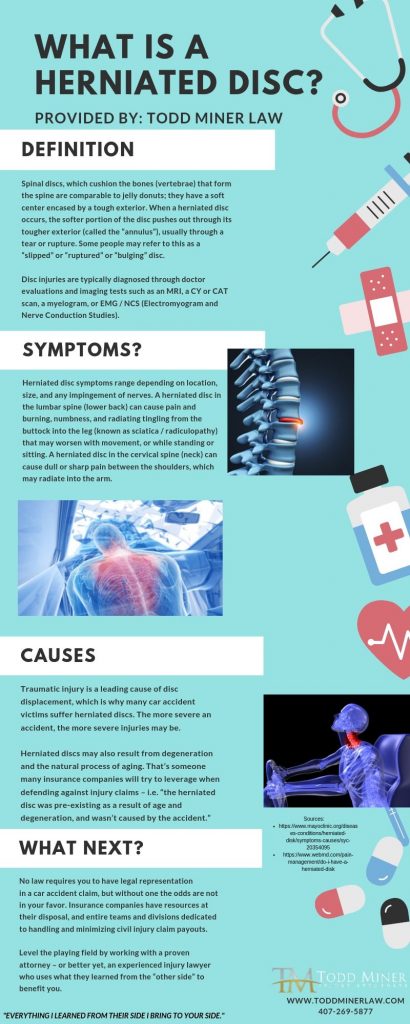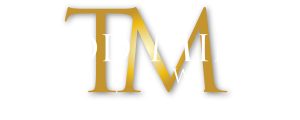Neck and back injuries are among the most common physical injuries sustained by individuals involved in car accidents. While they can range from minor aches and pains to profound or permanent injuries and impairments, they all have the potential to disrupt a person’s life, and create a number of added stressors, expenses, and damages, which victims and their loved ones must manage.
That’s true for one of the most common forms of neck / back injury – herniated discs – a seemingly “minor” ailment capable of causing serious and costly struggles for many victims. As Attorney Todd Miner notes:
“When I was an attorney for the largest auto insurance company in the country, the most common injuries I saw car accident victims suffer were to their neck and back. In almost all cases, the victim was initially receiving conservative chiropractic care or physical therapy. But then an MRI revealed a herniated disc, and the injured person found themselves needing surgery. I handled hundreds of these case on behalf of insurance companies. Now, I represent only those who are the victims of someone else’s careless or reckless driving, or other negligence; I actually fight the same insurance companies I used to work for! This is what I mean when I say, ‘everything I learned on their side, I bring to your side.’”
Jump to:
- What’s a Herniated Disc?
- Herniated Disc Causes, Symptoms & Treatment
- Herniated Disc Car Accident Claims
- What’s My Case Worth?
What is a Herniated Disc?
Spinal discs, which cushion the bones (vertebrae) that form the spine, are comparable to jelly donuts; they have a soft center encased by a tougher exterior. When a herniated disc occurs, the softer portion of the disc pushes out through its tougher exterior (called the “annulus”), usually through a tear or rupture. Some people may refer to this as a “slipped” or “ruptured” or “bulging” disc.
Because there’s limited space in the spinal canal, herniated discs can inflame and irritate nerves, and, fail to function as shock absorbers for spinal bones, and cause substantial pain, weakness, numbness, and reduced mobility. Herniated discs can occur anywhere along the spine, such as the lower back (lumbar spine) – which is most common – or the neck (cervical spine).
Disc injuries are typically diagnosed through doctor evaluations and imaging tests such as an MRI, a CT or CAT scan, a myelogram, or EMG / NCS (Electromyogram and Nerve Conduction Studies).
Herniated Disc Causes, Symptoms & Treatment
- Traumatic injury is a leading cause of disc displacement, which is why many car accident victims suffer herniated discs. The more severe an accident, the more severe injuries may be. However, many people suffer herniated discs from minimal trauma.
- Herniated discs may also result from degeneration and the natural process of aging. That’s something many insurance companies will try to leverage when defending against injury claims – i.e. “the herniated disc was pre-existing as a result of age and degeneration, and wasn’t caused by the accident.” An experienced lawyer with experience and medical insight and connections with medical experts, evidence, and testimony can work to refute these types of arguments.
- Herniated disc symptoms range depending on location, size, and any impingement of nerves. A herniated disc in the lumbar spine (lower back) can cause pain and burning, numbness, and radiating tingling from the buttock into the leg (known as sciatica / radiculopathy) that may worsen with movement, or while standing or sitting. A herniated disc in the cervical spine (neck) can cause dull or sharp pain between the shoulders, which may radiate into the arm.
Treatment for a herniated disc or multiple herniated discs will also depend on the unique circumstances at hand. This may include:
- Conservative care: Limiting activity, rest, and anti-inflammatory drugs;
- Non-surgical / non-invasive care: This may include chiropractic care, stretching, massage, ice and heat therapy, electrical muscle stimulation, and physical therapy;
- Injections: Nonsteroidal anti-inflammatory medications may be used as spinal injections (sometimes called trigger point injections” or as epidural steroid injections which are performed under X-ray guidance;
- Surgery: In cases where conservative and non-invasive care fail to provide relief, or injuries are severe, surgery may be recommended. As with any surgery, there are risks to herniated disc surgery, but it can benefit patients with severe pain that hinders their quality of life, progressive neurological deficits, impairment of normal bodily functions, and other serious symptoms. Lumbar spine surgery and cervical spine surgery can involve different procedures and approaches, such as a laminotomy to remove a portion of the lamina, a discectomy to remove the disc, and a spinal fusion to stabilize the spine. Some procedures may remove herniated discs and replace them with artificial discs. Cervical spine surgery can be performed using similar methods, although incisions to access the disc may be made from the front of the neck (anterior) or back of the neck (posterior). If fusion is not required, stabilization can be achieved with medical screws and devices.
Herniated Disc Car Accident Claims
When it comes to herniated disc injuries and personal injury lawsuits, there are a few things worth knowing:
1. FILING CLAIMS
Auto accident victims who suffer neck and back injuries may have available legal pathways to recover their damages – that is, a personal injury claim filed against the at-fault driver, or some other relevant at-fault party(s). These are legal actions which allege another party (such as a negligent motorist, truck driver, or product manufacturer) caused a victim’s preventable harm and losses, and should be held financially liable for the resulting damages.
2. INSURANCE COMPANIES
In nearly all car accident cases, personal injury claims filed by victims are handled and defended by the defendant’s insurance carrier rather than the defendant themselves. That’s because the insurance company is who typically pays any judgment or settlement.
3. BARRIERS TO FAIR COMPENSATION
Because insurance companies have money on the line, they aren’t going to automatically or immediately compensate victims for their damages; they’re going to investigate and explore every possible option to dispute, deny, or underpay claimants.
Attorney Todd Miner knows this all too well, having worked as an insurance defense attorney for one of the country’s largest insurance companies. He knows the tactics insurance companies take in car accident cases, and the barriers victims may face when it comes to recovering full and fair compensation.
4. IMPORTANT TIPS
While filing a claim to recover losses from a responsible party seems straightforward in theory, it’s a much more complex, and often contested, process. We’ve discussed the difficulties of personal injury claims on our blog many times, and have provided a number of tips to help victims help themselves when it comes to protecting their rights. These include things like:
- Seeking timely medical treatment. This is especially important for neck and back injuries, which may not manifest immediately after an accident, and which may become worse when left untreated. In some cases, forgoing medical attention can prevent doctors from identifying serious and potentially life-threatening injuries – such as brain injuries or hemorrhaging that results from whiplash neck injuries, or serious herniation that requires surgery.
- Avoiding insurance company representatives. Insurance companies want to settle claims quickly, even before you know the full extent of your injuries, their impact on your life, and the total damages you’ve incurred. Avoid talking to insurance company reps who want you out of the way with quick low-ball settlements, or who want you to provide information they can potentially use against you, such as statements misconstrued as admissions of fault, even if they’re not or were never intended to be.
- Working with a lawyer. No law requires you to have legal representation in a car accident claim, but without one the odds are not in your favor. Insurance companies have resources at their disposal, and entire teams and divisions dedicated to handling and minimizing civil injury claim payouts. Level the playing field by working with a proven attorney – or better yet, an expert injury lawyer who uses what they learned from the “other side” to benefit you.
So, How Much is My Herniated Disc Claim / Settlement Worth?
For many folks dealing with accident-related injuries, questions about case value or what a potential herniated disc settlement looks like are difficult to answer. That’s because there are so many unique factors at play, and because the unique circumstances surrounding your accident and injury can impact any final herniated disc payout from the insurance company.
Though “it depends” is the only answer we can give when we don’t know a case, there are some things to keep in mind in terms of what may factor into settlement value for these cases:
- The Accident – The circumstances of the accident matter. If a crash was caused by another’s negligent or wrongful acts, victims may have the right to pursue a claim and recover compensation. If it was a victim’s own fault, or if they contributed to the accident at least in part, it could impact their ability to recover all if any of their damages.
- Insurance – An injury claim has little value if there’s no insurance to cover damages. In fact, settlement value or final verdicts depend greatly on whether there is available insurance coverage – whether from an at-fault driver’s liability insurance, the insurance of some other liability party(s) (i.e. a manufacturer of a defective product or a property owner), or a victim’s own insurance (if they have UM / UIM coverage). Experienced attorneys like those at Todd Miner Law®️ work to explore all viable options for insurance coverage.
- Your Injuries – The severity of injuries matters in herniated disc insurance claims. Severe injuries that result in long-term if not life-long impairments, reductions in quality of life, limited working ability, and significant pain and suffering objectively have more damages than less-severe or minor injuries where victims quickly resume their normal lives.
- Your Damages – What were your damages? They matter quite a bit. Victims with herniated discs should evaluate all physical, financial, and emotional damages associated with their injuries to ensure they pursue adequate compensation. Factors to consider may include:
- Severity of injury, physical pain and suffering, and impact on daily life;
- Lost wages or lost future earnings (from having to recuperate, attend doctor; appointments, or from an inability to work entirely / inability to perform the same work as before the accident);
- Scope of symptoms and treatment;
- Medical bills and any need for future medical treatment, devices, or medications;
- Duration of medical care, medication use, chiropractic or physical therapy visits;
- Whether a herniated disc was treated with steroid injections or epidurals;
- Whether surgery was performed, necessitating a recovery;
- Whether victims made a full physical recovery, or still face long-term or permanent impairments, disabilities, or limitations;
- Emotional pain and mental anguish;
- Emotional injuries experienced by close family members (in serious injury cases).
Aside from these factors, the quality of your legal representation can make all the difference in how your claim is resolved – whether the case is settled out-of-court, or goes to trial. In any scenario, a fair settlement is one that meets your full needs – for both your past losses and any projected damages you and your loved ones may occur in the future.
At Todd Miner Law®️, we leverage Attorney Todd Miner’s insight in insurance defense and experience as a proven injury attorney to handle all types of car accident claims, including those where victims suffer neck and back injuries, herniated discs, and even catastrophic injuries or paralysis.
Questions about a car accident case and your rights? Call 407-214-4743Todd Miner Law®️ at or contact us online for a free consultation. We serve clients across Orlando and Central Florida.









